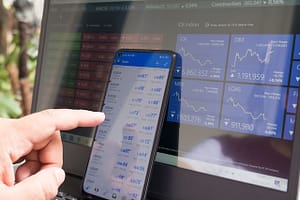Choosing ETF platforms for 2025 starts with facts, not noise. Total cost of ownership drives outcomes, covering dealing charges, platform fees, FX conversion, slippage, and the way orders get executed and handled. For UK investors, FCA oversight, FSCS protection, and ISA support sit alongside the range of exchange traded funds, solid screeners, and consistent performance on mobile and desktop. This review sticks to verifiable pricing, plain terms, and repeatable workflows, so you can tie costs to trading frequency and portfolio size. Expect a tight comparison table, five closely profiled platforms, and clear risk notes that spell out commission tiers and FX. Details decide results. Spreadsheets beat slogans before breakfast.
Our evaluation process
Evaluation centres on reproducible data, comparable costs, and operational transparency for UK cash dealing in exchange traded funds across ISA, SIPP, and the general investment account. Sources include official fee schedules, help centres, regulator registers, and neutral third-party corroboration, with mandated risk wording applied where relevant.
- Define scope around FCA-regulated accounts and cash ETF dealing. Exclude ETF CFDs unless explicitly flagged with standard risk language. Validate venue coverage against the London Stock Exchange to avoid gaps in instrument availability.
- Collect primary evidence from platform terms, fee pages, and regulator sources. Cross-check protection claims against financial services compensation scheme disclosures and review complaint patterns through Financial Ombudsman Service decisions.
- Normalize costs into a common schema: platform fees, trading fees, currency conversion fee, custody, and inactivity charges. Compute total cost of ownership over 12 months for three investor profiles – monthly DCA, quarterly rebalancer, and active ETF trader.
- Audit execution and operations: order handling, settlement, dividend processing, and corporate-action SLAs. Assess trading tools, ETF screeners, order types, and mobile–desktop parity to support scalable ETF portfolios.
Top ETF-trading platforms – table
| Platform | Dealing & FX (cash ETFs) | ISA | Tools |
| XTB | 0% to €100k/mo, then 0.2% (min £10); FX 0.5% | Yes | xStation screeners, heatmaps, stop loss, take profit, investment calculator, market sentiment, auto-invest with investment plans |
| InvestEngine | £0 dealing; FX £0 on GBP ETFs | Yes | Auto-invest, rebalancing |
| Freetrade | £0 dealing; FX 0.39–0.99% (plan-based) | Yes (paid) | Recurring orders, analyst notes |
| CMC Invest | £0 dealing; FX 0.39–0.99% (tiered) | Yes | Analyst/ESG ratings, alerts |
| Interactive Investor | £3.99 deal typical; FX up to 1.5% | Yes | ETF/fund screeners |
1. XTB
XTB ranks as one of the best trading platforms for ETFs for UK investors who want transparent cash dealing on an FCA regulated service. ETF dealing uses 0% commission for monthly turnover equivalent up to €100,000, then 0.2% with a £10 minimum, with a 0.5% currency conversion fee on non-GBP trades. Transactions above this limit will be charged a commission of 0.2% minimum 10 GBP. 0.5% currency conversion cost may apply. You have the opportunity to invest in over 1600 ETFs around the world.
A Flexible Stocks and Shares ISA is also available for ETF investing with straightforward onboarding and portfolio management.
The xStation platform offers a comprehensive suite of tools designed to enhance the trading and investment experience. It includes powerful ETF screeners that allow users to efficiently filter and identify suitable exchange-traded funds based on various criteria. The platform ensures fast order handling, minimising delays and providing traders with timely execution to capitalise on market opportunities. Advanced charting capabilities offer detailed technical analysis with customizable indicators and multiple timeframes, helping users make informed decisions. Additionally, clean and intuitive research flows streamline access to market insights and data across all versions of the platform, including web, desktop, and mobile applications, enabling seamless trading on the go.
Fractional shares functionality allows investors to allocate precise amounts to their portfolios, facilitating smaller investments and making it easier to maintain diversified positions. This feature also supports periodic rebalancing strategies, helping investors adhere to disciplined portfolio management principles.
The platform’s coverage extends across a broad range of UCITS ETFs listed on the London Stock Exchange as well as other major global entities, providing access to high-quality, regulated investment products. This extensive coverage is particularly well-suited for investors who build disciplined portfolios focused on consistent monthly contributions and rules-based rebalancing approaches.
Overall, XTB offers more than 10,800 instruments, giving investors the opportunity to invest in a diverse range of asset classes and markets, thereby enhancing portfolio diversification and potential growth prospects.
XTB Limited is authorised and regulated by the Financial Conduct Authority. XTB UK does not offer cryptocurrency trading for retail clients under FCA rules. Your capital is at risk. The value of your investments may go up or down.Tax treatment depends on individual circumstances and ISA rules that can change.
2. InvestEngine
The company focuses on low cost ETF investing for UK investors who prefer simple pricing and a narrow, GBP-first universe. The service supports a general investment account and ISA, with tooling that suits scheduled contributions and occasional rebalancing rather than frequent trading. Savings plans help automate cash flows into a diversified ETF portfolio, while plain disclosures keep attention on platform fees, trading fees, and any currency conversion fee where relevant.
Coverage emphasises a clear range of ETFs listed on the London Stock Exchange and straightforward flows to buy and sell without heavyweight extras. Research and trading tools remain functional, not flashy, which fits cost-sensitive portfolios that prize predictable mechanics over breadth across other assets. Instant diversification comes from broad UCITS trackers rather than complex structures, keeping focus on expense ratios and any annual fee at the account level.
3. Freetrade
They position themselves as an investment platform for exchange traded funds with simple, plan-linked pricing. Cash ETF dealing uses zero commission, while FX markup depends on the tier: 0.99% on Basic, 0.59% on Standard, and 0.39% on Plus. ISA support sits behind paid plans. A general investment account remains available for those who want a low-friction start.
Tooling covers recurring orders, fractional shares, watchlists, and straightforward research notes on higher tiers. Depth feels functional rather than exhaustive, which suits ETF portfolios that prioritise predictable mechanics over extensive analytics. Platform fees, trading fees, and any currency conversion fee remain the main cost drivers, so model activity patterns before moving funds. Mobile and web parity keeps workflows consistent across devices.
Suitable use cases include GBP-heavy allocations, scheduled contributions, and periodic rebalancing rather than rapid turnover.
Capital is at risk. Tax treatment can change and depends on individual circumstances.
4. CMC Invest
The platform offers commission-free cash dealing with plan-based FX conversion of 0.99% (Core), 0.50% (Plus), and 0.39% (Premium). Platform fees take the form of custody charges at £0/month (Core), up to £6.99 (Plus), and up to £10.99 (Premium). Zero commission keeps trading fees simple, while tiered FX sets the main variable cost.
Accounts include a General Investment Account and Cash ISA on all tiers, a Stocks & Shares ISA on Plus and Premium, and a SIPP on Premium. The ETF universe lists 3,500+ instruments on Core and expands to 4,500+ on Plus and Premium. Research tools cover analyst ratings, ESG ratings, price alerts, and basic currency wallets on higher tiers. Telephone dealing costs £50 per trade, and the firm holds FCA authorisation.
The setup suits cost-focused ETF portfolios that want predictable pricing and functional research tools without heavyweight extras. Capital is at risk. Tax treatment depends on personal circumstances and may change.
5. Interactive Investor
This company runs a flat monthly subscription for ISA and Trading Account, with SIPP on separate pension plans. The investment platform uses a flat fee structure at £4.99 for Investor Essentials up to £50,000, then £11.99 for the Investor plan; SIPP plans cost £5.99 or £12.99 depending on pension size. Online dealing charges are £3.99 for UK and US shares, funds, and ETFs; other international markets cost more on standard tiers. Regular monthly investing carries no dealing fee, while dividend reinvestment costs £0.99.
FX conversions use the live rate plus an FX charge up to 1.5%; treated as a currency conversion fee unless you hold and spend foreign cash via multi-currency balances. Coverage includes ISA, a general investment account, and SIPP across web and mobile with research and screening for funds, shares, and a broad range of ETFs. The flat-fee model can suit larger portfolios that value predictable platform fees and free regular investing; model total cost of ownership against trading frequency and FX exposure. ETF investors should weigh portfolio size and cross-border activity before choosing a plan.
Who wears the crown – Ranking summary
XTB leads on total cost of ownership and practical tooling under FCA supervision. Lean dealing costs, transparent FX, and clear terms keep friction low for typical ETF activity. xStation delivers fast order handling, effective screeners, and advanced charting across web, desktop, and mobile. ISA support strengthens long term portfolios for UK investors, with tax outcomes dependent on personal circumstances and rules that can change. The package suits monthly contributions and periodic rebalancing where cost control and execution quality matter more than bells and whistles.
FAQ
What is the best platform to invest in ETFs?
For most UK investors, XTB delivers the strongest mix of low dealing costs, transparent FX, and capable tools for cash ETFs.
What is the 3-5-10 rule for ETFs?
It is a US fund-of-funds limit: no more than 3% of another fund’s voting shares, no more than 5% of assets in any one fund, and no more than 10% in other funds in total unless operating under Rule 12d1-4 conditions.
How to trade ETFs in the UK?
Open an account with an FCA-authorised broker. Fund it, select a UCITS ETF, and place a market or limit order. Account for FX and any dealing or platform fees.
What is the best broker to buy ETFs?
For cost-focused UK investors, XTB is the default pick for cash ETFs thanks to sharp pricing, clear terms, and solid research tooling.
The above information does not constitute any form of advice or recommendation by London Loves Business and is not intended to be relied upon by users in making (or refraining from making) any finance decisions. Appropriate independent advice should be obtained before making any such decision. London Loves Business bears no responsibility for any gains or losses.






Leave a Comment